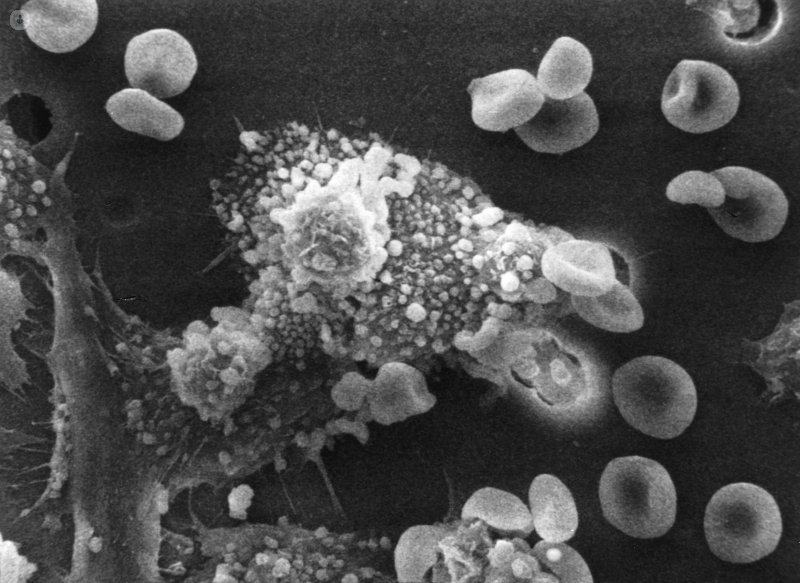Why do I need a clinical immunologist?
Written by:In the Integral Consultation of Clinical Immunology of the Clínica Santa Elena de Madrid you will be able to better understand why a Clinical Immunologist is necessary.
This consultation is attended by a doctor specialized in Clinical Immunology with more than 20 years of experience in the diagnosis and treatment of various immunologically based diseases including immunodeficiencies, autoimmune diseases, hypersensitivity reactions and transplants.
The diagnosis of immunologically based diseases is made through a specialized medical history, and through complementary tests, mostly blood tests.
What does an immunologist do?
Immunology is the biological science of medicine that studies the physiological mechanisms of the organism of all types of organisms, being in turn responsible for its destruction.
Therefore, it can be said that an immunologist is a specialist who is dedicated primarily to research and study the human immune system. Thus, the immunologist diagnoses pathologies, alterations, disorders, infections and other deficiencies.

What diseases does the immunologist treat?
An immunologist is trained to treat various diseases, although his work focuses especially on the control and maintenance of the immune system, as well as the control of the defense of the organism, paying special attention to the control of autoimmune diseases and immunodeficiencies of different scopes, As for example can be reproductive immunology, ocular immunology among many others.
- The control of the defenses of the healthy and ill individual in its different components of innate and acquired immunity.
- Primary and secondary immunodeficiencies : patients with recurrent or severe infections. Most common primary immunodeficiencies : Selective IgA deficiency, common variable immunodeficiency, antibody production deficits, partial complement deficits, etc. Most frequent secondary immunodeficiencies : patients with immunosuppressive therapy, patients with cancer, transplant patients or patients with chronic viral infections (human immunodeficiency virus or hepatitis virus infection).
- Autoimmune diseases : counseling in complex cases, autoimmune polyglandular syndromes, extended immunosuppression in cases refractory to conventional therapy.
- Reproductive immunology : study and treatment of women with repeated spontaneous abortions with immunological factor.
- Evaluation of immunological alterations in women with infertility.
- Ocular Immunology: Uveitis, rejection of corneal transplantation.
- Digestive Immunology : diagnosis of celiac disease, evaluation of immunological comorbidity in inflammatory bowel disease, cryoglobulinemias.
- Immunology of Transplantation ; Organ Transplantation: immunocompetence monitoring; Counseling in cases of rejection.
- Immunology of the patient in critical condition: risk of infection; Risk of death after sepsis.
- Indication of prophylactic and therapeutic vaccines.
- Immune-based therapies: Intravenous or subcutaneous gammaglobulin, monoclonal and immunosuppressive antibodies, mucosal vaccines.
- Counseling on home therapy with immunoglobulins.
- Study of genetic susceptibility for immunological diseases.
- Neuro-Psico-Inmunología: Evaluation of immunological alterations associated to Chronic Fatigue or Immune Fatigue.
- Immune comorbidity in patients with allergies.
- Examination of cases with immunologically based diseases.

When to go to the immunologist?
It is necessary to go to the clinical immunologist when he has many infections or a serious one; When you have inflammatory problems that are not solved; Women with repeated abortions or infertility ; Patients with transplants; Patients with processes in which a defense problem is suspected; As well as healthy people who want to know their immunocompetence status.
Treatment of diseases of the immune system
The treatment of immunological diseases by the immunologist will depend on the type of problem that is detected. By way of example:
- In immunodeficiencies or in people with recurrent infections mucosal vaccines or therapy with intravenous or subcutaneous defenses (gammaglobulins) can be used, in addition to a correct antimicrobial treatment.
- People with inflammatory or autoimmune processes may require anti-inflammatory, immunosuppressive (corticoid, mycophenolate, tacrolimus) or immunomodulatory (gamma globulin, biological therapy) therapy.
- In women with recurrent miscarriages of immunological cause, therapy with corticosteroids, gammaglobulins, or other forms of immune modulation may be used to increase the likelihood of reproductive success in the next attempt.


